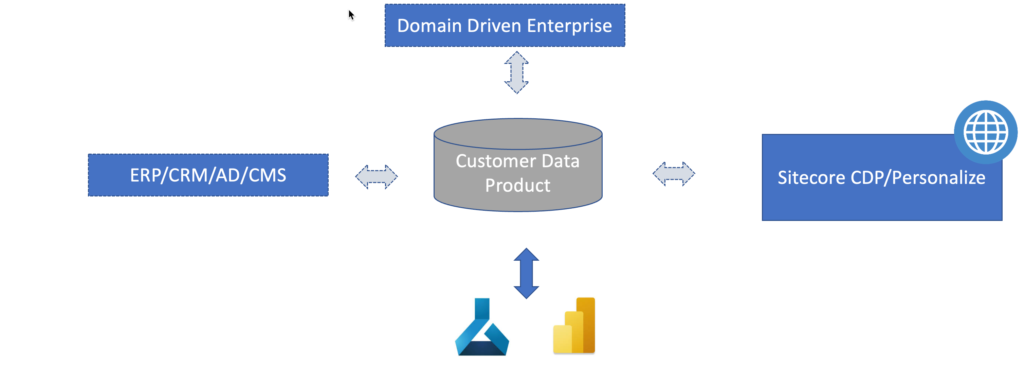Presenting at SUGCON EU this year was an amazing experience. My session focused on creating a scalable and sustainable data-driven enterprise with the new Sitecore Composable Stack using modern tools and architecture principles to gain future data insights and build a predictive analytics ecosystem. Although Data Mesh and modern architecture principles are technology agnostic, I discovered that Azure currently offers the most straightforward low-code Data Mesh setup among all cloud platforms.
As with every presentation I’ve ever given, the part I enjoyed the most was the research work and the development of a working PoC. However, the most critical aspect of the presentation was the question and answer portion. During this session, I received several questions regarding the comparison between Azure Synapse and Sitecore Connect/CDP, and why one should be used over the other. These questions delve into the importance of modern data architecture and can set a company on the right course when the architecture is appropriately chosen. While both technologies are not mutually exclusive, both can be utilized to build the ultimate data-driven enterprise based on Data Mesh principles.
What is Data Mesh
In 2019, Zhamak Dhgani introduced a modern analytics design pattern that set forward a new trend in data architecture called Data Mesh. This architectural pattern focuses on domain-driven design principles, treating data as a product, implementing self-service data platforms, and establishing federated governance. Ultimately, the goal of Data Mesh is to create a more flexible and adaptable data architecture that can keep pace with the rapidly evolving needs of modern organizations.
When to use Sitecore CDP

The Sitecore Customer Data Platform(CDP) is an excellent choice for developing a Customer Data Product, as it allows for data extension and can operate on numerous readily available API endpoints in both real-time and batch modes. Using Sitecore Connect or relying on a newly announced feature called Unified Tracking, data can be aggregated into Sitecore CDP in a low-code or codeless way. The data can be readily utilized to establish omnichannel personalization routines and generate analytical visualizations. Employing the Sitecore CDP as a Customer Data Product can prove a particularly beneficial and cost-effective option for projects with fewer external data sources or those with more relaxed data governance requirements.
When to use Azure Synapse

In scenarios where an organization has implemented Data Mesh or possesses a significant number of data sources dispersed across different domains, Azure Synapse serves as an excellent option for constructing a Customer Data Product using low-code methodologies. Azure Synapse provides the necessary tools to transform and analyze large amounts of data, including low-code ETL routines and affordable data lake storage, all while ensuring adherence to data governance guidelines via Azure Purview and enabling data to be analyzed by ML models using Spark. Integrating Sitecore CDP into Azure Synapse can be achieved with ease through a low-code approach and by utilizing Sitecore CDP batch API and Data Lake Export Service.
When to used Sitecore Connect and Azure Synapse together
For those who depend on Sitecore Packaged Business Capabilities to fulfill most of their DXP requirements and necessitate the advanced analytics and ML capabilities offered by Azure Synapse, this solution may prove to be the most beneficial. This approach hinges on leveraging Sitecore CDP to host DXP Customer Data and utilizing it as a data source for a larger implementation of a Customer Data Product hosted by Azure Synapse.
Selecting the appropriate tools for data analytics is critical in ensuring the effective and efficient management of an organization’s data. Whether it be through the implementation of Sitecore Connect or employing powerful solutions like Azure Synapse, the chosen tools should align with the organization’s data governance requirements and overall objectives. Ultimately, the success of a data analytics solution depends on its ability to provide insights that facilitate informed decision-making and provide measurable business outcomes.
Recent Comments